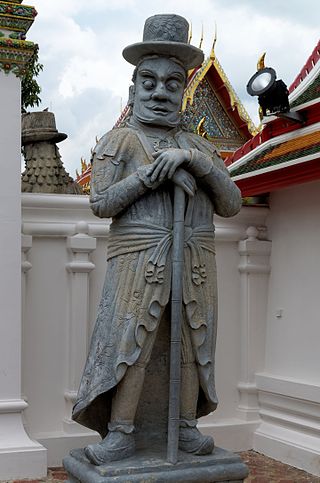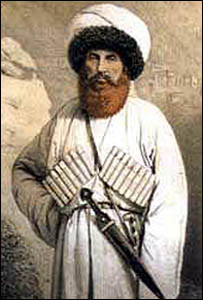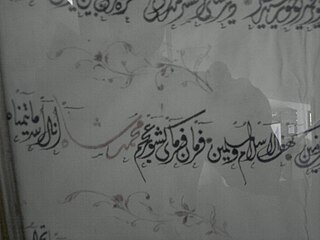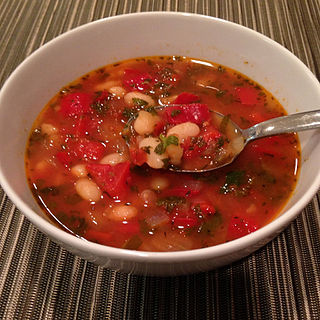
Shah is a royal title that was historically used by the leading figures of Iranian monarchies. It was also used by a variety of Persianate societies, such as the Ottoman Empire, the Kazakh Khanate, the Khanate of Bukhara, the Emirate of Bukhara, the Mughal Empire, the Bengal Sultanate, historical Afghan dynasties, and among Gurkhas. Rather than regarding himself as simply a king of the concurrent dynasty, each Iranian ruler regarded himself as the Shahanshah or Padishah in the sense of a continuation of the original Persian Empire.

A synonym is a word, morpheme, or phrase that means exactly or nearly the same as another word, morpheme, or phrase in a given language. For example, in the English language, the words begin, start, commence, and initiate are all synonyms of one another: they are synonymous. The standard test for synonymy is substitution: one form can be replaced by another in a sentence without changing its meaning. Words are considered synonymous in only one particular sense: for example, long and extended in the context long time or extended time are synonymous, but long cannot be used in the phrase extended family. Synonyms with exactly the same meaning share a seme or denotational sememe, whereas those with inexactly similar meanings share a broader denotational or connotational sememe and thus overlap within a semantic field. The former are sometimes called cognitive synonyms and the latter, near-synonyms, plesionyms or poecilonyms.

Farang is a Persian word that originally referred to the Franks and later came to refer to Western or Latin Europeans in general. The word is borrowed from Old French franc or Latin francus, which are also the source of Modern English France, French.

The Avars, also known as Maharuls, are a Northeast Caucasian ethnic group. The Avars are the largest of several ethnic groups living in the Russian republic of Dagestan. The Avars reside in the North Caucasus between the Black Sea and the Caspian Sea. Alongside other ethnic groups in the North Caucasus region, the Avars live in ancient villages located approximately 2,000 meters above sea level. The Avar language spoken by the Caucasian Avars belongs to the family of Northeast Caucasian languages. Sunni Islam has been the prevailing religion of the Avars since the 14th century
The Azerbaijani alphabet has three versions which includes the Arabic, Latin, and Cyrillic alphabets.

Ajam is an Arabic word meaning mute. It generally refers to non-Arabs, including those whose mother tongue is not Arabic. During the Arab conquest of Persia, the term became a racial pejorative. In many languages, including Persian, Turkish, Urdu–Hindi, Azerbaijani, Bengali, Kurdish, Gujarati, Malay, Punjabi, and Swahili, Ajam and Ajami refer to Iran and Iranians respectively.

The Persian alphabet, also known as the Perso-Arabic script, is the right-to-left alphabet used for the Persian language. It is a variation of the Arabic alphabet with five additional letters: پ چ ژ گ, in addition the obsolete ڤ.

Middle Persian or Pahlavi, also known by its endonym Pārsīk or Pārsīg in its later form, is a Western Middle Iranian language which became the literary language of the Sasanian Empire. For some time after the Sasanian collapse, Middle Persian continued to function as a prestige language. It descended from Old Persian, the language of the Achaemenid Empire and is the linguistic ancestor of Modern Persian, an official language of Iran, Afghanistan (Dari) and Tajikistan (Tajik).

Shemirān, also known as Shemirānāt is the capital of Shemiranat County, Tehran Province, Iran, but is actually located just north of the borders of Tehran County along Chamran Expressway and Sadr Expressway and it is the northernmost district of the city of Tehran.

A cezve, also ibriki/briki, srjep is a small long-handled pot with a pouring lip designed specifically to make Turkish coffee. It is traditionally made of brass or copper, occasionally also silver or gold. In more recent times cezveler are also made from stainless steel, aluminium, or ceramics.
Malana, also spelled as Molana or Maulana, is a title, mostly in Central Asia and South Asia, preceding the name of respected Muslim religious leaders, in particular graduates of religious institutions, e.g. a madrassa or a darul uloom, or scholars who have studied under other Islamic scholars.
Ishq is an Arabic word meaning 'love' or 'passion', also widely used in other languages of the Muslim world and the Indian subcontinent.

Chorba or shorba is a broad class of stews or rich soups found in national cuisines across the Middle East, Maghreb, Iran, Turkey, Southeast Europe, Central Asia, East Africa and South Asia. It is often prepared with added ingredients but served alone as a broth or with bread.
Shahan Dasht, locally known as Shoon Dasht, is a village in Bala Larijan Rural District, Larijan District, Amol County, Mazandaran Province, Iran.

Romano d'Ezzelino is a small city with c. 14,000 residents in the Veneto region of northern Italy. It lies in the foothills of Monte Grappa and is located among some hills and country. The name "Romano" comes from Arimanno, a Lombard word meaning "military settlement". "Ezzelino" refers to the family of Ezzelini, who moved to Romano in 1199.
An agglutinative language is a type of synthetic language with morphology that primarily uses agglutination. In an agglutinative language, words contain multiple morphemes concatenated together, but in such a manner that individual word stems and affixes can be isolated and identified as to indicate a particular inflection or derivation, although this is not a rule: for example, Finnish is a typical agglutinative language, but morphemes are subject to consonant alternations called consonant gradation.
Hesaruiyeh is a village in Khatunabad Rural District, in the Central District of Shahr-e Babak County, Kerman Province, Iran. At the 2006 census, its population was 221, in 54 families. Hesaruiyeh is located roughly 10 kilometres (6.2 mi) southeast of Shahr-e Babak.
The Poso horseshoe bat or belligerent horseshoe bat is an endangered species of horseshoe bat found only on Sulawesi Island, which is part of Indonesia.










